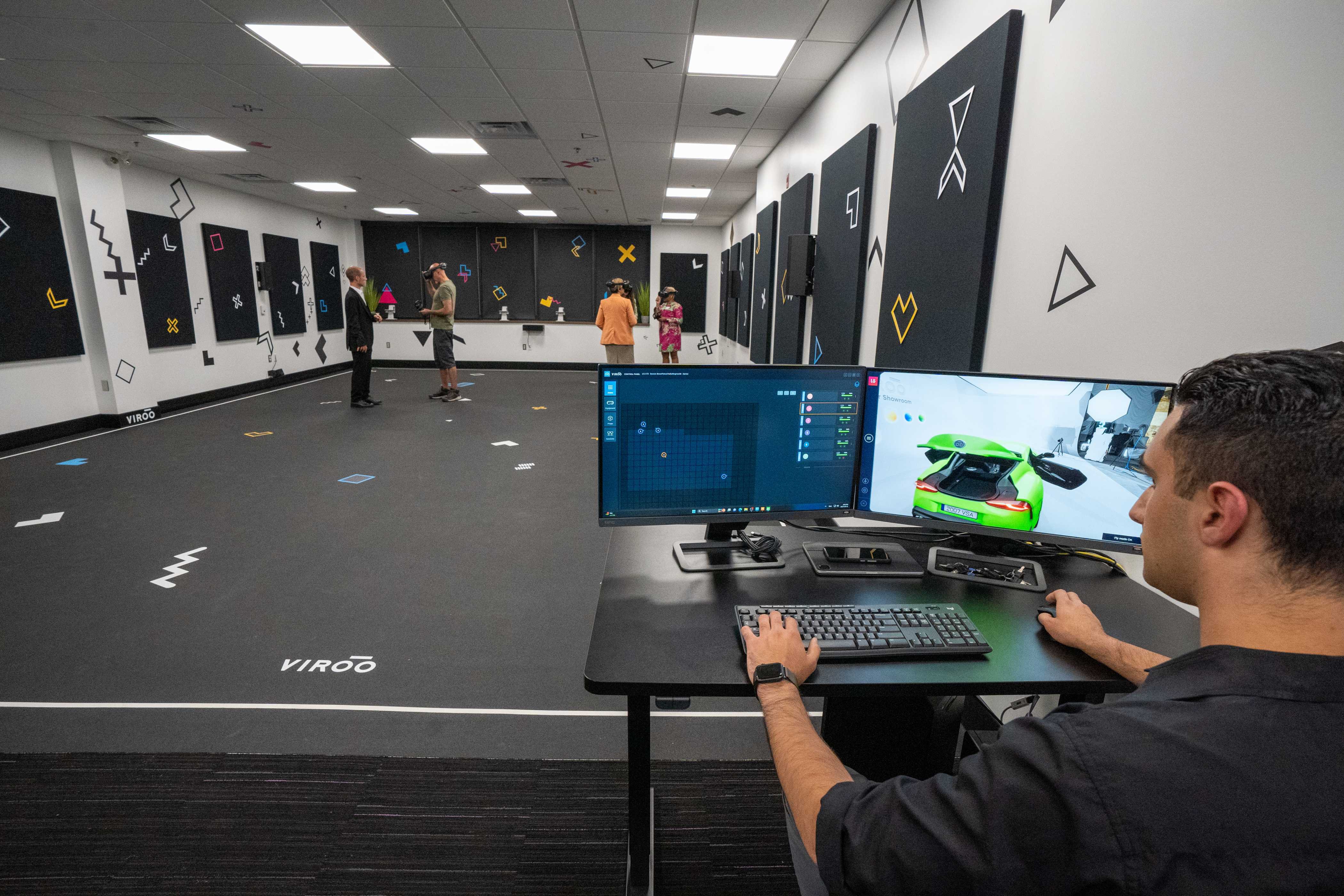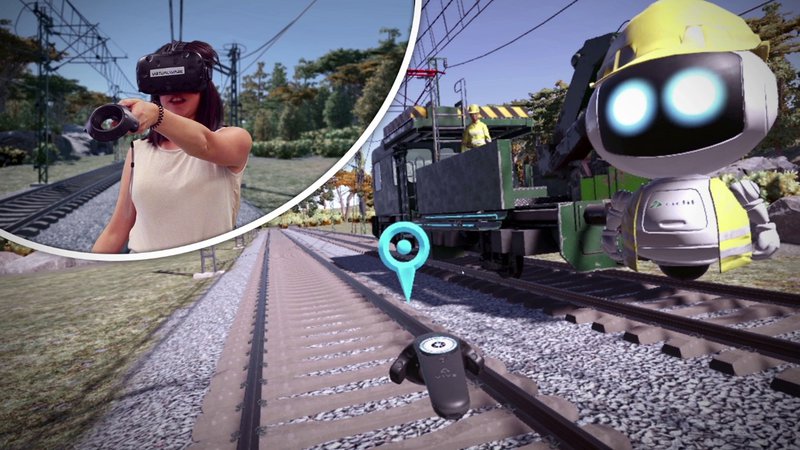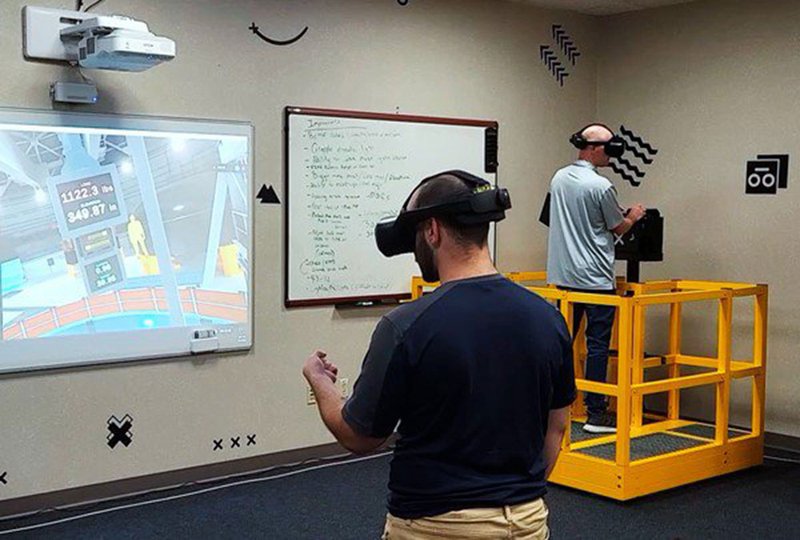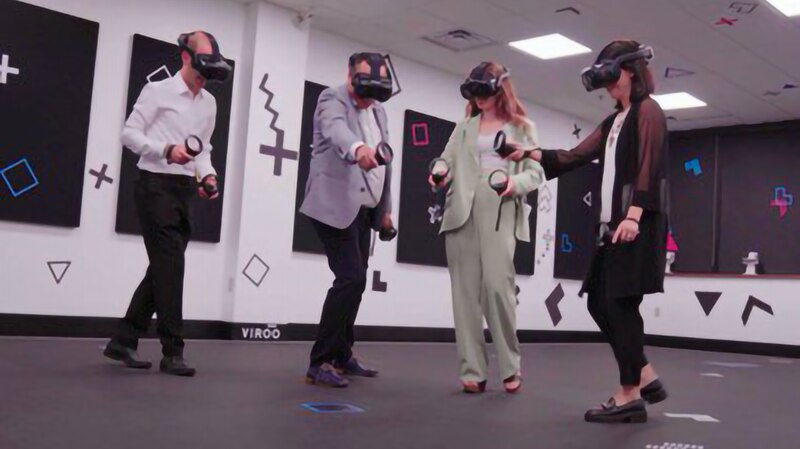Virtualware: Pioneering the Future of Immersive Training and Virtual Simulation with VIROO® Rooms

AEC | Manufacturing | Training/Simulation | Case Study
5 minute read
Imagine mastering complex industrial processes, collaborating with peers across continents in a virtual classroom, or exploring a life-sized nuclear reactor simulation, in a true-to-life and low-pressure setting where mistakes carry no real consequences, affording limitless opportunities to practice. Thanks to Virtualware, a global leader in Virtual Reality (VR) solutions, these experiences are no longer confined to science fiction.
Founded in Bilbao, Spain, in 2004, Virtualware boasts a rich history of innovation. Their flagship product, VIROO®, is revolutionising enterprise VR, spearheading its adoption through sustainable and cutting-edge strategies. Recognised for its pioneering approach in the immersive technology landscape, VIROO® is quickly becoming the gold standard for developing and deploying multi-user VR applications in both industry and education.
Since the launch of HTC VIVE's first headset in 2016, Virtualware has harnessed their hardware to create unparalleled VR training and simulation solutions. Their large-scale and multi-user capabilities stand out amongst competitors, offering truly immersive experiences that redefine training and simulation.

(2016) ADIF, Spanish Railway Infrastructure Manager, VR Simulator | Virtualware
Real-world benefits at GE Vernova and McMaster University
Virtualware has garnered success globally, particularly in the US, where it has forged a partnership with GE Vernova to introduce a pioneering solution within the nuclear industry. This innovative approach is built upon the VIROO® VR Platform and its immersive VR Rooms concept, facilitating an increase in hands-on training time for personnel. Moreover, it equips workers with the necessary skills to effectively manage unforeseen events and emergencies through the simulation of real-life complex scenarios The complete range of VR simulators offered include Fuel Movement and Vessel Assembly and Vessel Distension processes.
“Customers can take our hands-on VR simulators to train newer employees, make teams more proficient, help with communication skills and really improve their performance, which in the end, improves the industry,” says Jarret Heitzmann, Virtual Reality Program Owner, GE Vernova.

(2022) GE Hitachi Nuclear Energy Fuel Movement VR Simulator powered by VIROO® I GE Vernova.
Virtualware also partnered with the Faculty of Engineering at McMaster University to introduce its first VIROO® Room at McMaster Innovation Park in Hamilton (Canada). The new VR Lab called IMRSV@MAC 100m2 facility has made it possible for students and industry partners to leverage this innovative technology and therefore benefit from interacting with simulated environments.
“The unveiling of the custom-built immersive room will provide access to students, faculty, and businesses to push boundaries and explore the use of VR tools and technologies in the region,” says Ali Emadi, engineering professor and Canada Research Chair in Transportation Electrification and Smart Mobility, McMaster Engineering.

(2022) McMaster University immersive VR Room powered by VIROO® | Virtualware
In june 2023, Cubic Transportation Systems (CTS), part of Cubic Corporation, and McMaster University announced that Dr. Hanna Haponenko, postdoc at McMaster Automotive Resource Centre (MARC), has been recognized with the UITP Young Researcher Award for her research on simulating accessibility challenges faced by individuals with disabilities, evaluate transportation options for people from different socioeconomic backgrounds and demographics, and conduct staff training exercises utilising McMaster Engineering's VIROO® Room.
Keeping ahead of the curve with VIROO® Rooms
In its 20 years of history in the enterprise VR space, Virtualware has always tried to anticipate market needs and offer solutions as quickly as possible. That’s why they started with the immersive VR Rooms concept back in 2017 with the technology available at this time, using backpacks and their own tracking system. This was great, but a bit complicated in operation. As VR technology evolved and this solution gained awareness in high-risk industries and education, Virtualware kept innovating and updating their solution, incorporating new capabilities and improving operation. For instance connecting several VIROO® Rooms remotely or even multi projection systems such as CAVEs or similar.
Today, with the demand for realistic multi-user training environments for complex processes and higher education institutions looking for new digital initiatives to prepare their students better for the future, immersive VR rooms are increasing their presence worldwide.
Challenges are to be overcome
All of this success has not been without its challenges, though. Thankfully, Virtualware has a great attitude toward problems, believing that by pushing through, they’re guaranteed to be a stronger company at the end of it.
In 2017, upon the initiation of their multi-user large-scale VR Room concept, Virtualware undertook the development of a proprietary tracking system to meet the specific requirements of their clientele. Recognising the potential obsolescence of their solution and anticipating advancements in the industry, particularly from companies such as HTC VIVE, they closely monitored developments. It was during the Mobile World Congress in Barcelona in 2022 that experiencing the VIVE Focus 3 changed everything. Chief Technology Officer Sergio Barrera and Chief Marketing Officer David Moreno recount the moment, “realising at that precise moment that the technology had reached the level of advancement we had anticipated. Consequently, within a span of a few months, we successfully integrated and deployed our updated VIROO® Room version, leveraging the enhanced capabilities and functionality offered by HTC VIVE technology.”
One of the most complex challenges they’ve found is achieving precise and reliable tracking for multiple users who are simultaneously engaging in a shared physical space. This involves overcoming issues related to occlusion and inaccuracies in the tracking system, where the view of one user's device may be obstructed by another.
Barrera explains how they overcame this problem: “By implementing VIVE Focus 3 in LBE Mode, we were able to address this challenge by leveraging our first version of the VIROO® Room, offering a truly free-roaming experience without the need for VR backpacks.”
VR technology has evolved significantly in recent years, but in the early days, movement was really restricted due to the wires required. Enabling low latency wireless streaming for VR headsets, maintaining the ability to render high-end 3D graphics on workstations, was therefore a significant technical hurdle, especially when aiming for a comfortable and unrestricted user experience in a free-roam setting.
Overcoming this challenge required optimising data transfer rates to minimise latency, ensuring a smooth and responsive experience for users. Thanks to the VIVE Business Streaming and its two-way data stream to ensure efficient transmission with low latency and Wi-Fi 6 support, Virtualware was able to remove the VR backpacks, reducing difficulties in operation without affecting the quality of the experience.
Recognition where it’s due
Since its founding in 2004, the company has garnered widespread recognition for its accomplishments.
Their first award came in 2019 when VIROO® was distinguished as the premier VR solution for businesses at the VR Awards, an honour reserved for solutions that effectively meet the specialised requirements of corporations, academic institutions, and governmental bodies. Two years later, Virtualware was acknowledged as the world’s most innovative VR company.
In 2023, Virtualware’s partners, GE Vernova, McMaster University’s Faculty of Engineering, and El Salvador University, won a coveted Brandon Hall Group Gold Award for Excellence in Technology, recognising the breakthrough initiative for workforce training and education utilising VIROO® Rooms.
The best is yet to come
Virtualware has deployed over 32 VIROO® Rooms worldwide, with a projected 60 installed by the end of 2024.
This is evidence that immersive VR rooms are increasingly becoming a vital element in industry training and higher education initiatives, and VIROO® is facilitating their accessibility. The promising future of this solution is shaped by advancements in Wi-Fi technology, which promise enhanced data transfer rates, reduced latency, and improved network efficiency. Additionally, developments in VR tracking and object recognition utilising Aruco markers, along with the emergence of more potent and energy-efficient VR/MR devices powered by the latest chipsets, contribute to a brighter outlook for the immersive VR experience.
“The happiness derived from having a successful product extends beyond mere financial gains.” Moreno continues, “Achieving success in the market brings a sense of accomplishment and validation to the individuals and teams involved in the solution's creation and development. HTC VIVE has played a pivotal role in our journey, highlighting the importance of collaborative efforts in achieving lasting success. The future is brighter than ever.”
For additional information about our solutions and how they can benefit your specific challenges, please don't hesitate to contact us.